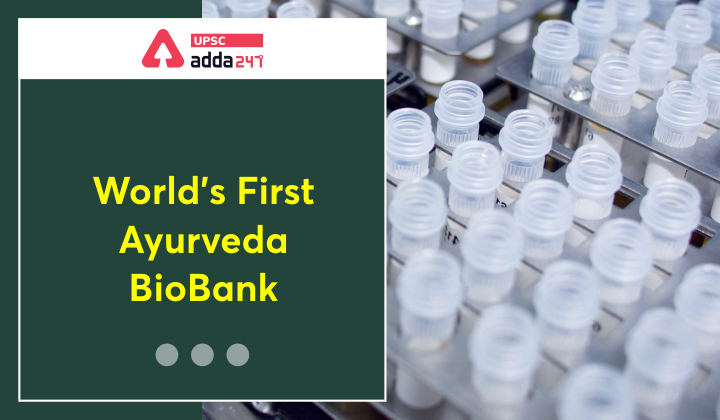Table of Contents
Relevance
- GS 3: Awareness in the fields of biotechnology.
Context
- Union Ayush Minister Shri Sarbananda Sonowal visited All India Institute of Ayurveda (AIIA) and assured all help to establish the first Bio-Bank of the world in Ayurveda at AIIA.
Key points
- He also inaugurated Multi-Purpose Yoga Hall & Mini Auditorium.
- He assured full-fledged support for further development of the Institute to make it world’s best Ayurveda Institute.
- At the Blood Bank, he advised to further deepen research on auto immune diseases and Leukaemia.
 Get free video for UPSC CSE preparation and make your dream of becoming an IAS/IPS/IRS a reality
Get free video for UPSC CSE preparation and make your dream of becoming an IAS/IPS/IRS a reality
What is a bio bank?
- A biobank is a collection of biological samples (such as blood) and contains other health information.
- It can be used to understand molecular pathways and to improve the diagnosis, prognosis, and treatment of various diseases.
5G Technology: Everything You Need to Know
National Heart Failure Biobank
- The first National Heart Failure Biobank (NHFB) in the country was inaugurated at the Sree Chitra Tirunal Institute for Medical Sciences and Technology (SCTIMST).
- The storage facilities include -20, -80-degree mechanical freezers and a liquid nitrogen storage system which can store bio-samples at -140 degrees perpetually for years. Currently, there are facilities to store nearly 25000 bio-samples.
- It would benefit the heart failure patients
- The biobank will provide insights into heart diseases and heart failure among Indian children and adults, which are very different from that seen in the West.
- The increase in the observed prevalence of long-COVID symptoms and post-COVID heart failure calls for long-COVID clinics to collect patient data and biospecimens that can be biobank for future research.
- Through the NHFB, researchers can get access to well-annotated biological specimens linked to clinical data while maintaining appropriate standards of quality and security.
- The samples are collected after informed consent from patients who are willing to donate specimens.



 TSPSC Group 1 Question Paper 2024, Downl...
TSPSC Group 1 Question Paper 2024, Downl...
 TSPSC Group 1 Answer key 2024 Out, Downl...
TSPSC Group 1 Answer key 2024 Out, Downl...
 UPSC Prelims 2024 Question Paper, Downlo...
UPSC Prelims 2024 Question Paper, Downlo...
